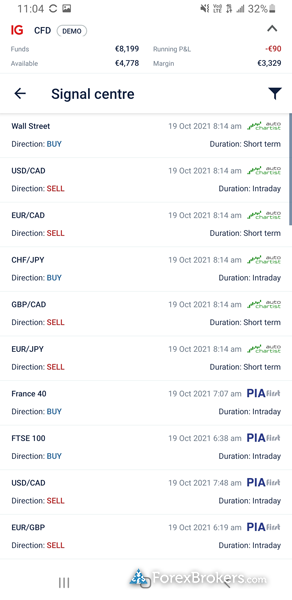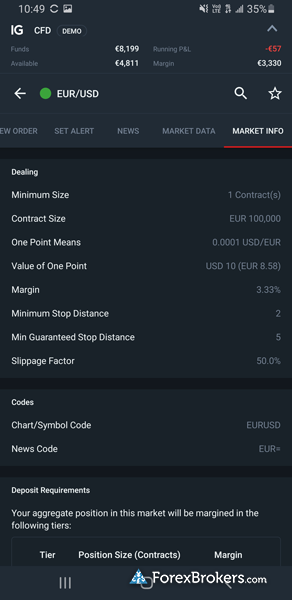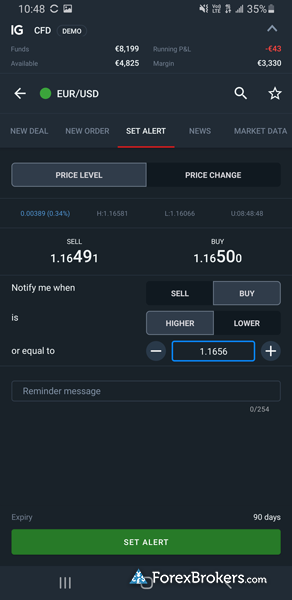Best Forex Brokers in Japan for 2025
ForexBrokers.com has been reviewing online forex brokers for over eight years, and our reviews are the most cited in the industry. Each year, we collect thousands of data points and publish tens of thousands of words of research. Here's how we test.
The Japanese Yen is one of the most popular currencies for trading on the forex market. Japan also hosts a large, active population of investors and forex traders.
Japan’s financial markets regulator is the Japanese Financial Services Authority (JFSA). JFSA’s high degree of trust has us ranking Japan as a Tier 1 jurisdiction in our proprietary Trust Score rating system.
The JFSA is a regulator with myriad functions, such as the planning and policymaking for Japan’s domestic financial system, and the supervision of financial institutions such as bank operators, money lending businesses, crypto-asset exchanges, credit unions, and insurance business providers.

Best Forex Brokers in Japan for 2024
To find the best forex brokers in Japan, we created a list of all forex brokers that accept residents of Japan, then ranked them by their Overall ranking.
Here is our list of the top forex brokers available in Japan:
Comparison of the Best Forex Brokers in Japan
Compare the best forex and CFDs brokers available to residents of Japan using our forex broker comparison tool or the summary table below. This broker list is sorted by my overall rankings of the top forex brokers.
| Company | Accepts JP Residents | Average Spread EUR/USD - Standard | Minimum Deposit | Overall Rating |
 IG IG
|
0.98 | £250.00 |
|
|
 Interactive Brokers Interactive Brokers
|
0.59 | $0 |
|
|
 FOREX.com FOREX.com
|
1.4 | $100 |
|
|
 AvaTrade AvaTrade
|
0.93 | $100 |
|
|
 XM Group XM Group
|
1.6 | $5 |
|
|
 FP Markets FP Markets
|
1.2 | $100 AUD |
|
|
 IC Markets IC Markets
|
0.62 | $200 |
|
|
 Vantage Vantage
|
1.30 | $50 |
|
|
 HYCM (Henyep Capital Markets) HYCM (Henyep Capital Markets)
|
1.2 | $20 |
|
|
 HFM HFM
|
1.2 | $0 |
|
|
 Questrade Questrade
|
N/A | $250 |
|
|
 ActivTrades ActivTrades
|
0.98 | $0 |
|
|
 Trade Nation Trade Nation
|
0.6 | $0 |
|
|
 Moneta Markets Moneta Markets
|
1.38 | $50 |
|
|
 easyMarkets easyMarkets
|
0.8 | $25 |
|
|
 IFC Markets IFC Markets
|
1.44 | $1 |
|
CFDs are complex instruments and come with a high risk of losing money rapidly due to leverage. Between 51% and 89% of retail investor accounts lose money when trading CFDs. You should consider whether you understand how CFDs work and whether you can afford to take the high risk of losing your money.
What is the best Japanese forex broker?
IG is the best forex broker in Japan in 2025. Regulated by the JFSA (and a member of the FFAJ), IG is an all-around excellent choice for forex traders in Japan. Whether you are a beginner, intermediate, or professional trader, IG’s award-winning mobile app delivers an outstanding trading experience. IG also offers a wide range of currency pairs, powerful investing tools, market research, forex demo accounts, educational content, as well as a slew of complex order types for advanced trading strategies. Learn more about why IG is a fantastic choice for forex traders of all experience levels by reading my full review of IG.
Check out a gallery of screenshots from IG's trading platforms, taken by our research team during our product testing.
Which forex broker has the best mobile app in Japan?
IG's Trading app is the best mobile app in Japan for forex trading in 2025. Forex traders in Japan will find that IG’s flagship mobile trading app delivers many of the same advanced features found in modern web trading platforms. With the IG Trading App, forex traders gain access to a user-friendly trading platform that is stacked with powerful tools and features. Featuring advanced technical analysis, customizable news headlines, trading signals, market research, and powerful trading tools that are directly integrated into IG’s mobile charts, IG’s mobile app provides a rich user experience without putting any limits on functionality.
Check out a gallery of screenshots from IG's mobile apps, taken by our research team during our product testing.
Is forex trading legal in Japan?
Yes, forex trading is legal in Japan and is a regulated activity for exchange-traded forex (futures) as well as over-the-counter (OTC) forex trading. Brokers that are regulated by the JFSA and licensed to offer forex trading must also be members of the Financial Futures Association of Japan (FFAJ) which is a non-governmental member-based self-regulatory organization (SRO) authorized by the Ministry of Finance in 1989.
The Securities and Exchange Surveillance Commission (SESC) operates under the authority of the Financial Services Agency (FSA) and is Japan’s principal financial sector regulator, and is responsible for conducting market surveillance, investigating and reporting market misconduct, and supervising and inspecting financial instruments businesses.
It’s important to always make sure that your broker is regulated to reduce your chance of dealing with a scam broker. For residents of Japan, trading forex with a broker that is regulated locally is an added benefit, such as in the case of a dispute that you are unable to resolve directly with your broker. Filing a complaint with a local regulator can create more pressure for the broker to resolve the dispute amicably.
Why regulation is important
Choosing a well-regulated forex broker is important for avoiding forex scams. Check out my popular educational series that teaches you how to identify common forex scams and provides helpful information about what to do if you've been scammed. For crypto traders, I explain how you can spot common crypto scams.
Japan’s financial markets
Forex traders will recognize the Japanese Yen (JPY) as Japan’s national currency, which is issued and managed by the Bank of Japan. The JPY has become one of the most popular currencies for trading on the massive global forex market. The USD/JPY currency pair (also known as the “gopher”) is one of the most commonly traded currency pairs in the entire forex market.
Japan’s Tokyo Stock Exchange (TSE) – or, Tōshō – dates all the way back to 1878. Suspended during World War II, it reopened in 1949 following the issuance of the Securities Exchange Act, and in 2013 the TSE completed a merger with the second-largest stock exchange in Japan – the Osaka Securities Exchange (OSE) – to form the Japan Exchange Group (JPX). The JPX now ranks globally as one of the largest stock exchange groups.
Where can I trade forex in Japan?
There are a number of brokers that will facilitate forex trading in Japan – some of which are regulated locally by the JFSA, and some which are regulated in other countries (you can check out my list of the best brokers in Japan at the top of this guide). I always recommend choosing a broker that is regulated locally in the country where you reside (except where related financial consumer protection laws are not yet established or enforced). Many forex brokers will accept clients from jurisdictions (such as Japan) in which they are not locally regulated, but those brokers may hold sufficient licenses from other major jurisdictions where there are similar regulatory and compliance requirements.
Compare Japan Brokers
Popular Forex Guides
- Best Forex Brokers for 2025
- Best Copy Trading Platforms for 2025
- Best Low Spread Forex Brokers for 2025
- Compare Forex Brokers
- Best Forex Trading Apps for 2025
- International Forex Brokers Search
- Best Forex Brokers for Beginners of 2025
- Best Brokers for TradingView of 2025
- Best MetaTrader 4 (MT4) Brokers for 2025
More Forex Guides
Methodology
At ForexBrokers.com, our reviews of online forex brokers and their products and services are based on our collected data as well as the observations and qualified opinions of our expert researchers. Each year we publish tens of thousands of words of research on the top forex brokers and monitor dozens of international regulator agencies (read more about how we calculate Trust Score here).
Our research team, led by Steven Hatazkis, conducts thorough testing on a wide range of features, products, and services. We test all available trading platforms for each broker – whether they are proprietary or come from third-party providers – and evaluate them based on a host of data-driven variables. Our research team collects and validates thousands of data points each year.
We also take an in-depth look at each broker’s commissions and fees, such as bid/ask spreads – including the average spread data for some of the most popular forex currency pairs. We research other trading costs, such as inactivity or custody fees, minimum deposit requirements, VIP rebates and/or discounts, and a range of other important fee-based data points.
Some of the other important research categories that are factored into our testing include mobile trading accessibility and capability, availability of market research and educational content, and each broker’s regulatory status and number of held regulatory licenses.
All websites and web-based platforms are tested using the latest version of the Google Chrome browser. Our Desktop PCs run Windows 11, and we use MacBook Pro laptops running the latest version of macOS to test trading on the go.
We also test on mobile devices; for Apple, we test using the iPhone XS running iOS 16, and for Android we use the Samsung Galaxy S9+ and Samsung Galaxy S20 Ultra devices running Android OS 13.
Read our full explanation and accounting of our research and testing process to learn more about how we test.
Forex Risk Disclaimer
There is a very high degree of risk involved in trading securities. With respect to margin-based foreign exchange trading, off-exchange derivatives, and cryptocurrencies, there is considerable exposure to risk, including but not limited to, leverage, creditworthiness, limited regulatory protection and market volatility that may substantially affect the price, or liquidity of a currency or related instrument. It should not be assumed that the methods, techniques, or indicators presented in these products will be profitable, or that they will not result in losses. Read more on forex trading risks.

























